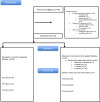Computer-assisted cognitive rehabilitation in persons with multiple sclerosis: Results of a multi-site randomized controlled trial with six month follow-up
- PMID: 29477372
- PMCID: PMC6047944
- DOI: 10.1016/j.dhjo.2018.02.001
Computer-assisted cognitive rehabilitation in persons with multiple sclerosis: Results of a multi-site randomized controlled trial with six month follow-up
Abstract
Background: The effects of multiple sclerosis (MS) on cognition have gained increasing recognition as one of the major disabling symptoms of the disease. Despite the prevalence of these symptoms and their impact on quality of life, limited attention has been given to strategies that might help manage the cognitive changes commonly experienced by persons with MS.
Objective: The primary purpose of this study was to determine the effectiveness of a novel computer-assisted cognitive rehabilitation intervention MAPSS-MS (Memory, Attention, Problem Solving Skills in MS) in a multi-site trial with persons with MS.
Methods: Persons with MS (N = 183) with cognitive concerns were randomly assigned to either the 8-week MAPSS-MS intervention or usual care plus freely available computer games. Participants completed self-report and performance measures of cognitive functioning, compensatory strategies and depression at baseline, immediately after the MAPSS-MS intervention, and three and six months post-intervention. Changes in study outcomes were analyzed using intention to treat methodology, ANOVA with repeated measures, and ANCOVA.
Results: Both groups improved significantly on all outcome measures. The intervention group outperformed the comparison group on all measures, and there were statistically significant differences on selected measures.
Conclusion: Findings suggest that MAPSS-MS is a feasible intervention that could be broadly implemented in community settings. It has been shown to be modestly successful in improving cognitive functioning.
Keywords: Cognitive rehabilitation; Multiple sclerosis; Randomized controlled trial.
Copyright © 2018 The Authors. Published by Elsevier Inc. All rights reserved.
Conflict of interest statement
The author(s) declare(s) that there is no conflict of interest regarding the publication of this article.
References
-
- O’Brien AR, Chiaravalloti N, Goverover Y, DeLuca J. Evidenced-based cognitive rehabilitation for persons with multiple sclerosis: a review of the literature. Arch Phys Med Rehabil. 2008;89(4):761–769. - PubMed
-
- Goretti B, Portaccio E, Zipoli V, et al. Impact of cognitive impairment on coping strategies in multiple sclerosis. Clin Neurol Neurosurg. 2010;112(2):127–130. - PubMed
-
- Trapp BD, Peterson J, Ransohoff RM, Rudick R, Mörk S, Bö L. Axonal transection in the lesions of multiple sclerosis. N Engl J Med. 1998;338(5):278–285. - PubMed
Publication types
MeSH terms
Grants and funding
LinkOut - more resources
Full Text Sources
Other Literature Sources
Medical


